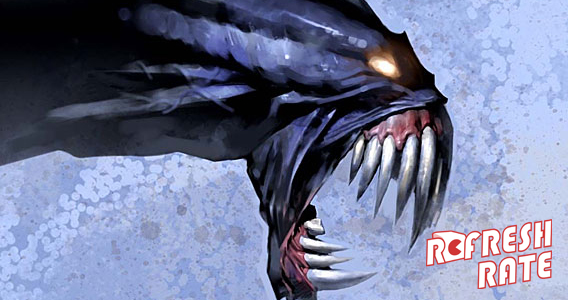
Next year, developer Digital Extremes will revisit The Darkness—after a significant four year gap since the original Starbreeze cult hit. The gap of time was long enough that it was fair to think the sequel might never materialize; after all, though The Darkness was well regarded critically, it did not seem to strike pay dirt with audiences—much like Mirror’s Edge, the future of the franchise seemed doubtful before it ever really got started.
With The Darkness II delayed into February (having been originally slated for an October release) after having mercilessly teased me with brutal gameplay footage, I had to satisfy my need for more Darkness by revisiting the Starbreeze original.
The Darkness was one of the first handful of games I played for this generation of consoles (I was something of a late adopter), and it seems like an obvious game for me to play: as a super-powered shooter based on a comic, it covers most of my bases. I picked the title up based on those very virtues, but truth be told, when the game began, I thought that maybe I had made a mistake.
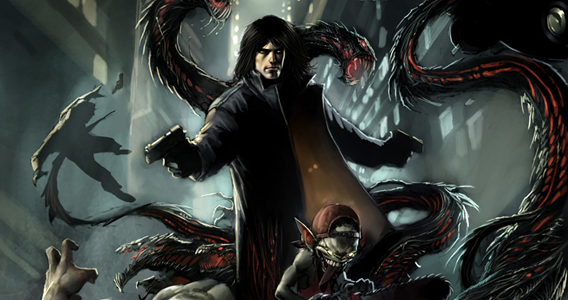
The flaws are easy to spot: the shooting mechanic is sloppy, with an auto-aim that fails as often as it functions; it’s possible to expend entire clips without hitting the enemy, regardless of the fact that the red reticule hovers directly over them; weapon control is hardly fluid, making it hard to acquire targets both up close and at range.
Meanwhile, enemies react inconsistently to weapons fire and can take a few too many shots before going down. The result is that, if the player takes a guns-only approach, the experience is imbalanced and unsatisfying—and this is almost damning in the first mission of the game, before the powers of the Darkness are unlocked.
Those powers redeem the gameplay in an immediate fashion, and remain the driving force and saving grace throughout. Though the mechanic offers only four basic powers (one of which being a set of special guns that fall prey to the flawed shooting mechanic), each offers unique applications and a visceral sense of empowerment.
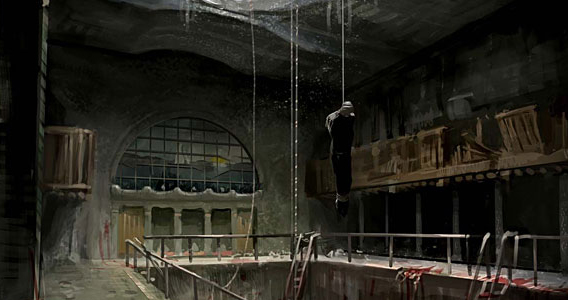
In the final chapters, the player becomes grossly overpowered, but like much of the game, this imbalance is in service to the narrative. As an eclipse falls, the Darkness becomes a force of nature; lights shatter as Jackie passes them, darkling minions spawn endlessly from the dark and run rampant. Jackie smashes through an army of mobsters, the Darkness dragging him, lurching forward, ripping and tearing.
In a genre that is caked in inflated, meaningless violence, it’s surprising that it can still have weight in a game as deliberately over the top as The Darkness—but that’s where the Darkness succeeds: in its sincerity, in genuine characters and conflict that create an atmosphere of gravity and hopelessness.
Violence is something the player seeks naturally in a game such as this; it is, of course, why we play shooters—but in this game, the player does so with the knowledge that he damns Jackie with each life taken, and a sense of hopelessness and grim futility sets in, reinforced at every step by Mike Patton’s voice of the Darkness, whispering in the player’s ear, urging him to violence.
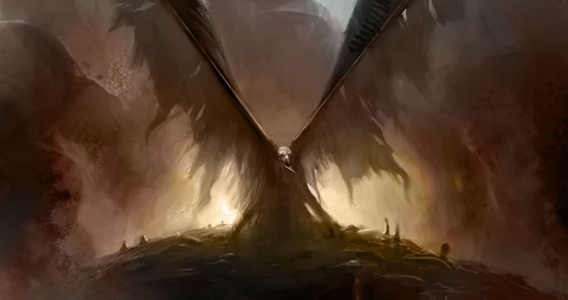
It’s an interesting twist on the common convention of the voice in the head of the player; the commanding officers and Cortanas and Anya Strouds that are nigh-ubiquitous in the shooter realm. They tell us to move up, to run here, to shoot there—to hold the line or complete the objective. The Darkness is a little different; it wants Jackie to survive, but only in such a way that he suffers, that he can be subjugated. The Darkness is a mad, timeless demon that needs to own Jackie—and it does this by giving everything the player is asking for.
The Darkness doesn’t want you to think about consequence, it doesn’t want to encourage empathy—it spurs you to tear men in half and eat their hearts. It howls at you when you’re human and chuckles grimly when you’re not.
There’s a relationship there, too, because the Darkness cares for Jackie—it cares for him in the way that it must care for itself, because, functionally, it is Jackie. It can’t hate him, it can’t kill him; it has to convince him that it is on his side—that they are in things together. It’s the ultimate unhealthy relationship that the Darkness tries to cultivate by giving Jackie the power to take his revenge, by begging him to take it.
This creates a push and pull, the sort that characterizes any good fictional relationship: when both parties need each other, when there’s something of a tug of war that nobody can ever win. It’s startlingly authentic for a story about a cosmic devil-god bound to a mob hitman, where even the monster can elicit a scrap of empathy and is vulnerable even in its perfect evil; it needs Jackie, needs him to protect it by surviving.
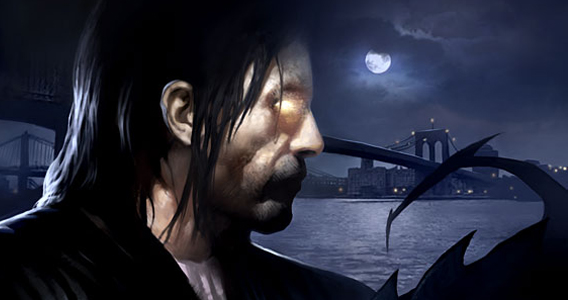
Patton offers a performance that is perhaps one of the best the videogame industry has seen, his voice hissing, bubbling and cracking, espousing a true and genuine inhumanity that paints the character brilliantly—but it isn’t just Patton that makes this work.
The other side of the equation is Kirk Acevedo—who players may recognize as Charlie Francis from Fringe. Acevedo’s Jackie speaks in a sober whisper, sorrowful even when furious, detached, and perpetually disaffected by his lot in life. Jackie is the good guy who does bad things, empathetic, but deeply flawed.
Jackie is endeared to the player throughout the game, especially during the loading screen monologues, where Jackie might recall a childhood memory, provide a humorous anecdote, or swear grim oaths. He brings sense of life to the city, having tales of its characters, memories and attachments to its landmarks. Early in the game, if the player so chooses, Jackie can sit down and watch the entirety of To Kill A Mockingbird with his girlfriend, and its nuances such as this that serves to bind the player to him.
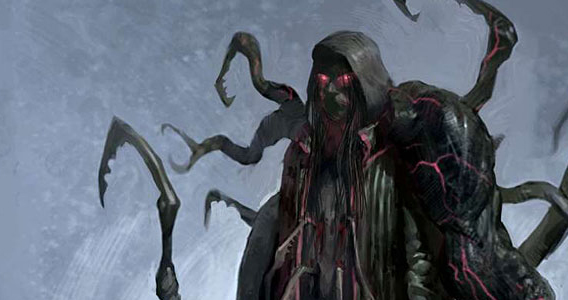
In the end, Jackie loses. The player completes his objectives, passes the final stage, the credits roll—but Jackie loses. There was never a possibility that he could win, in part for his own choices, but also because the player was there making sure he lost, listening to the Darkness and doing the things that damn him.
Deciding the fate of our characters has become an increasingly common feature of modern videogames; our actions dictate endings, or our placement on a morality scale—and it creates the sensation that we have helped our avatars grow and succeed in their tasks.
Rarely does the player look to hurt his character, to impede his progress, to diminish him. Of course, The Darkness doesn’t offer that choice—but if it did, would it really be a choice? Would one choose to send Jackie home, to swear off murder and vengeance? Send him off into the sunset to become a better person?
In the end, after shredding my way through hundreds of men and women to reach the final moments, chasing my revenge to the top of a lighthouse, I decided I didn’t want to follow through. Enough was enough; I wanted to save Jackie’s soul.
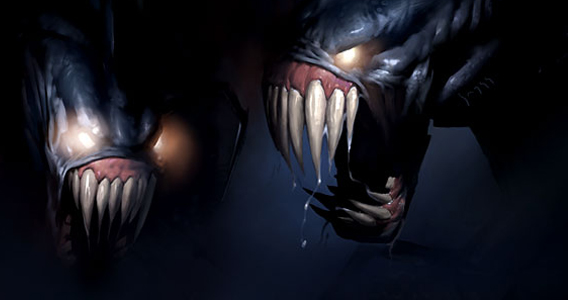
It was an absurd notion; as if his humanity could be restored after everything Jackie had done, as if sparing one life could rectify… anything. Only in fiction is the hero redeemed for staying his hand of final revenge, a ludicrous device. Still, at this time, suddenly, I wanted to do the morally upstanding thing and not rip out my enemy’s heart.
Of course, I understood that The Darkness wasn’t that sort of game—but I tried anyway. I backed away, I holstered my weapons, I sent the Darkness into remission—and I waited. I waited to see if maybe, just maybe, I had a choice here.
I didn’t.
I even tried to walk away, to leave the lighthouse and revenge behind—but as I said, The Darkness isn’t that sort of game. Even though I wanted it to be, it couldn’t be, because Jackie never had a choice. He was a prisoner of the Darkness, of his own misery, and of course, of you, and I, and the things we expect from our videogames.
If you told me that I had made this all up, that none of this really existed in that product, I probably couldn’t deny it. I love The Darkness, and I’ve spent a lot of time (over) thinking about it—and maybe to you it’s just a fun shooter with a solid script. It whispered to me, though—and if a narrative is possessed of such sincerity that I can extrapolate ramblings such as these from it, then there must be something there.
I don’t know if The Darkness II will carry the torch, in that respect. I’ve seen the game played, and I know that they have taken the gameplay to a new level: faster, sharper, and expanded—and certainly, that is something to applaud. The care and quality of a narrative, though? That is something that can’t be grasped from a demo. I have little doubt that Digital Extremes can craft a great demonic shooter—but whether they will produce a worthy successor to The Darkness remains to be seen.
I prefer 4 year gaps personally. This annual game nonsense needs to stop.
Comment by Ujn Hunter — September 15, 2011 @ 6:51 pm
Im pretty sure this game was the reason I bought an Xbox, good to know others liked it to lol I bought it off a friend a few days after it came out for 5 bucks because he wanted to get rid of it so bad. Can’t wait for the new one. And I agree about the 4 year wait not being a bad thing.
Comment by Erik — January 18, 2012 @ 2:25 pm